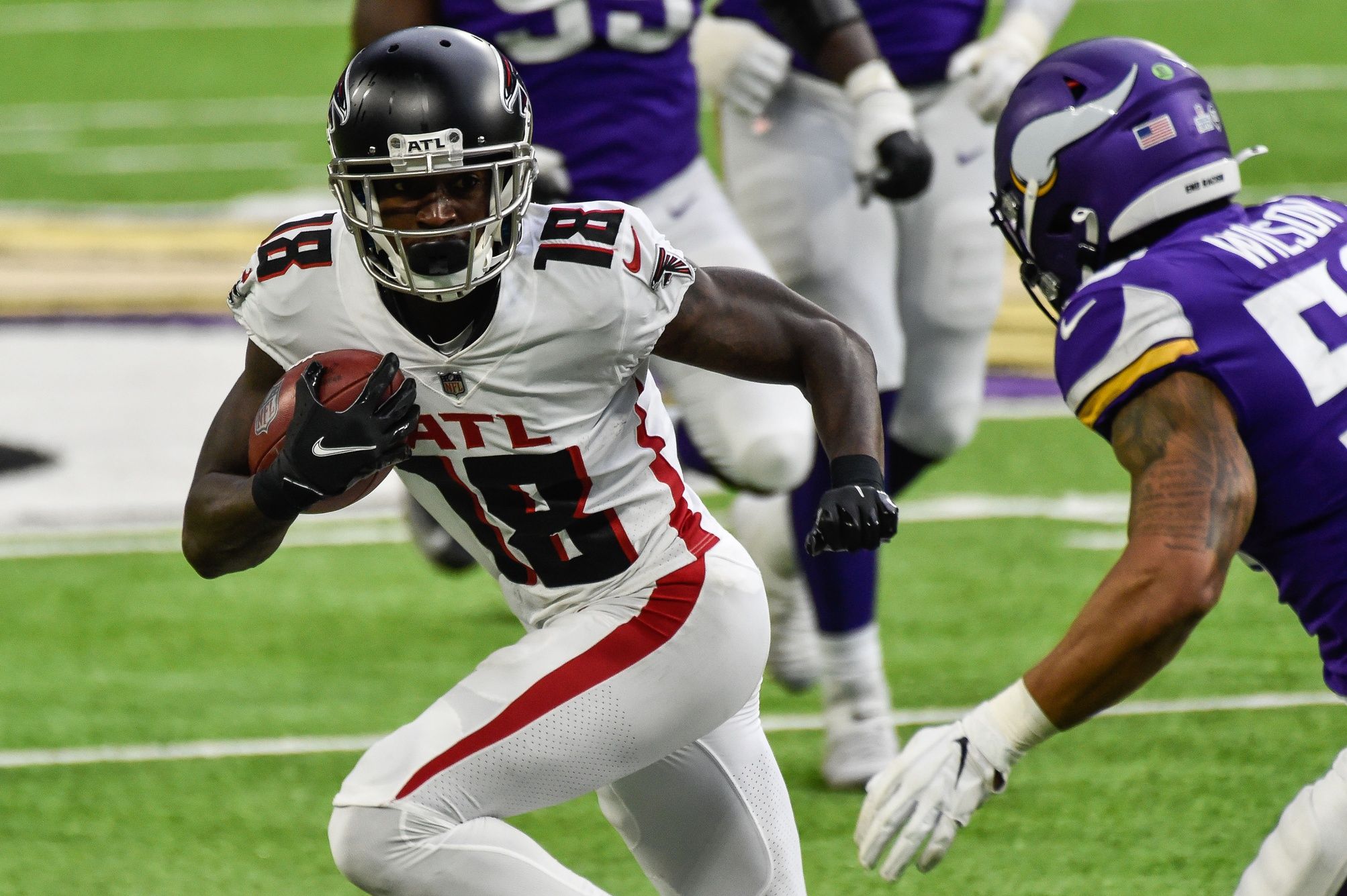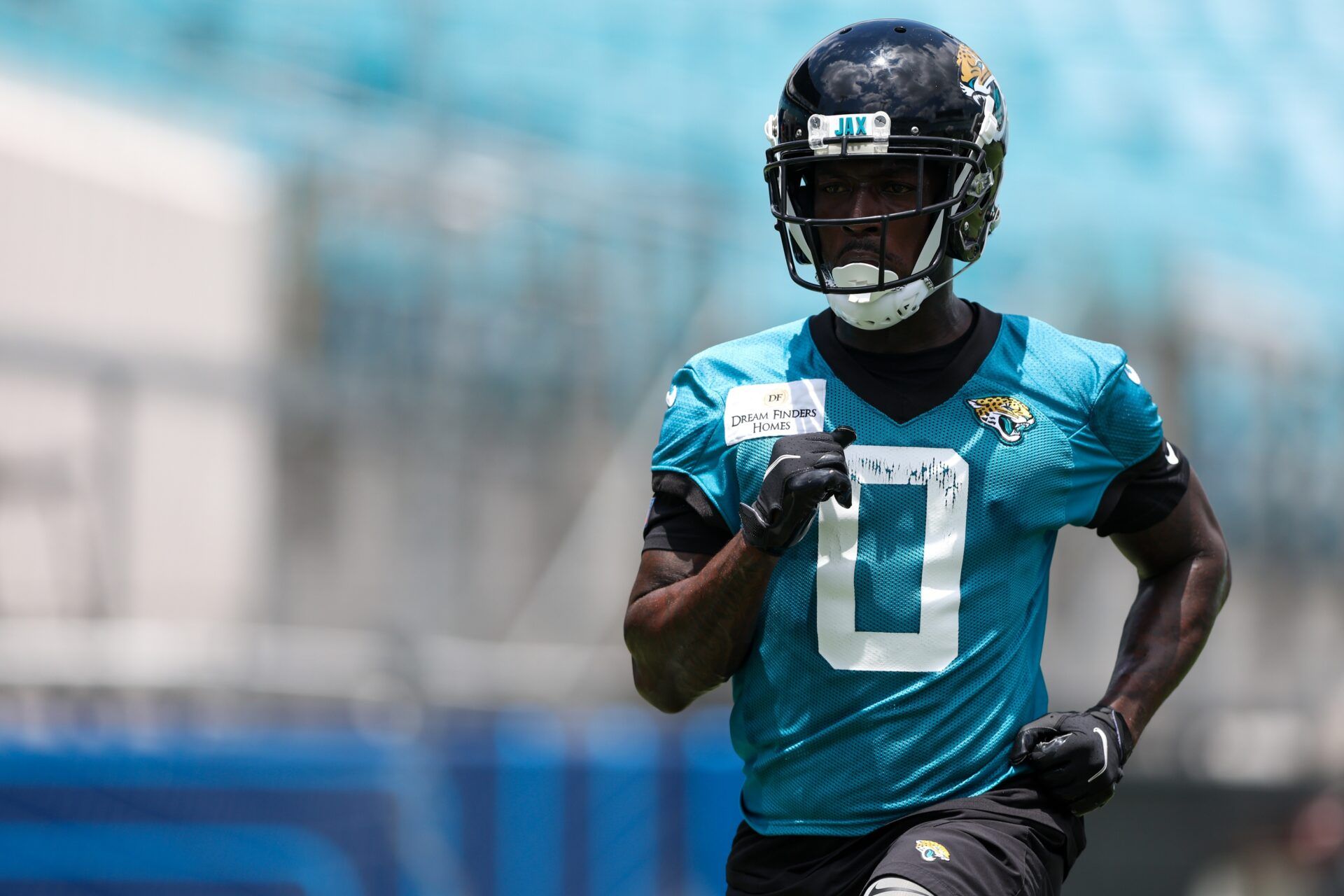After Atlanta Falcons receiver Calvin Ridley was suspended indefinitely, the franchise chose to trade the rights to the player to the Jacksonville Jaguars. Shortly after the trade, the NFL announced that Ridley’s suspension, which was enforced after he bet on NFL games, had been served after a year away from the game.
It’s a difficult situation to assess, given the uncertain future the NFL provided Ridley when the Falcons executed the trade. And it’s tough to determine how Ridley will perform in the future after a year away from the game. Yet, it’s possible it could be one of the critical moves that helps to decide the divisional races for both the AFC and NFC South.
Calvin Ridley Trade Details
Ridley was traded on Nov. 1, 2022, which was the NFL trade deadline for the 2022 season.
The Jaguars received:
- WR Calvin Ridley
The Falcons received:
- 2023 conditional fifth-round pick, No. 159 overall (WR Dontayvion Wicks)
- 2024 conditional fourth-round pick
The conditions of the two picks are related to Ridley’s status. If his suspension had run longer than the 2022 season, the Falcons would have received a sixth-round pick in the 2023 NFL Draft. We don’t know precisely how much longer Ridley would have needed to have been suspended to trigger the condition that dropped the pick from a fifth-round pick to a sixth-rounder.
The 2024 pick in the deal is somewhat complex, but in short, it’s a fourth-round selection right now but could become a third-round pick if he plays a substantial amount of time and escalates to a Round 2 selection if he signs an extension with the team.
The Jaguars would not have been on the hook for the 2024 conditional fourth-round pick if Ridley hadn’t been removed from the NFL’s suspended list or if he never makes the Jaguars’ roster. There is an as-of-yet unknown deadline for this condition, but it doesn’t matter now that Ridley is no longer suspended by the NFL.
That fourth-round pick in 2024 can become a third-rounder if Ridley both makes the team and meets certain playing time conditions. Those conditions are unknown. If Jacksonville signs Ridley to a contract extension, that pick becomes a 2024 second-round selection.
The Falcons traded the 2023 fifth-round pick to the Detroit Lions for cornerback Jeff Okudah.
Players Involved in the Calvin Ridley Trade
Aside from Ridley himself, Okudah ended up becoming a player involved in the trade, as the Falcons traded the pick they acquired from the Jaguars to add him to their roster. Dontayvion Wicks, who was drafted by the Packers, was another player directly impacted by the trade.
Winners and Losers From the Calvin Ridley Trade

The Falcons had no idea whether or not they would have had the ability to play Ridley in the near future when they traded him away to Jacksonville. Atlanta drafted him at a first-round price, and he performed at a high level, so it would be a shame to lose him for cheap.
That said, the Jaguars are likely going to extend Ridley if he performs like he did in 2020, earning 2.44 yards per route run — seventh in the NFL and just behind Stefon Diggs and ahead of Tyreek Hill and DeAndre Hopkins — and 1,374 yards. But Ridley has only hit that production level once in his career, making it unlikely he can reliably produce in the same way as Diggs or Hill.
The Falcons were smart to design the trade the way they did. The only way they can lose is if Ridley performs at that level for the next several years. In which case, he probably should have been traded for a first-round pick.
But in any other case, Atlanta seemingly comes out ahead. If Ridley turns into a strong third receiver, the Falcons probably end up with a third-round pick in addition to Okudah. If he can’t become that, they still have Okudah and a fourth-round pick. And if Ridley is a solid starter, Atlanta ends up with a second-round pick and Okudah.
It’s hard to deny that the Falcons won here, even if it’s a little easy to overrate Okudah based on his pedigree rather than his production.
Ridley himself is in a tough spot. If he produces like a strong WR2, then the Jaguars might be reticent to give him an extension, knowing it would cost them a second-round pick instead of a third. If he’s a bubble player, the difference between a third-round pick and a fourth-rounder might be a tiebreaker that works against him.
That said, there’s not much competition on the roster. Jacksonville invested quite a bit of free agency dollars in Christian Kirk, but he’s capped as a player. Other than him, Ridley’s only real other competition is Zay Jones, who might also be capped. Of any receiver on the roster, Ridley has the highest ceiling.
But it’s not as if he wouldn’t have had a great shot on the roster had the Falcons decided to keep him. This set of negative incentives — one that could even depress the contract value of offers he receives from Jacksonville — means he’s probably a loser in the deal.
That alternately means the Jaguars come out as winners. They have a lot of control going forward about what compensation they ultimately give up. That means they can always decide whether or not what Ridley produces is worth the price. It’s a rare situation where the buyer can determine the price after they learn the product’s value.
Jacksonville does have to consider the fact that they don’t have those assets available for a trade. All of them are basically held in place until the conditions of the trade are executed. After that, the picks that don’t go to the Falcons can be used in trades again.
Jones probably comes out of this as a loser, given that he’ll be competing with Ridley for snaps and that Ridley has hit higher highs fairly consistently. That impacts Jones’ production and could mean his 2025 free agency will look tough.
By the same token, Trevor Lawrence wins out. He gets a better group of potential receivers on the field even though the Jaguars didn’t invest at receiver in the first two days of the draft. Ridley is a potential franchise player at the position, and if he and Lawrence can connect, it will mean big returns for the franchise.
Drake London, who was drafted by the Falcons in 2022 shortly after they learned about Ridley’s suspension, probably loses out. He doesn’t have to worry about losing snaps to a starter, so he would only gain from having a high-level receiver on the field with him drawing coverage away. The same is true of Kyle Pitts, who might have benefited even more.
All in all, both the Falcons and the Jaguars walk away winners, while a number of receivers on both teams end up losing out.

